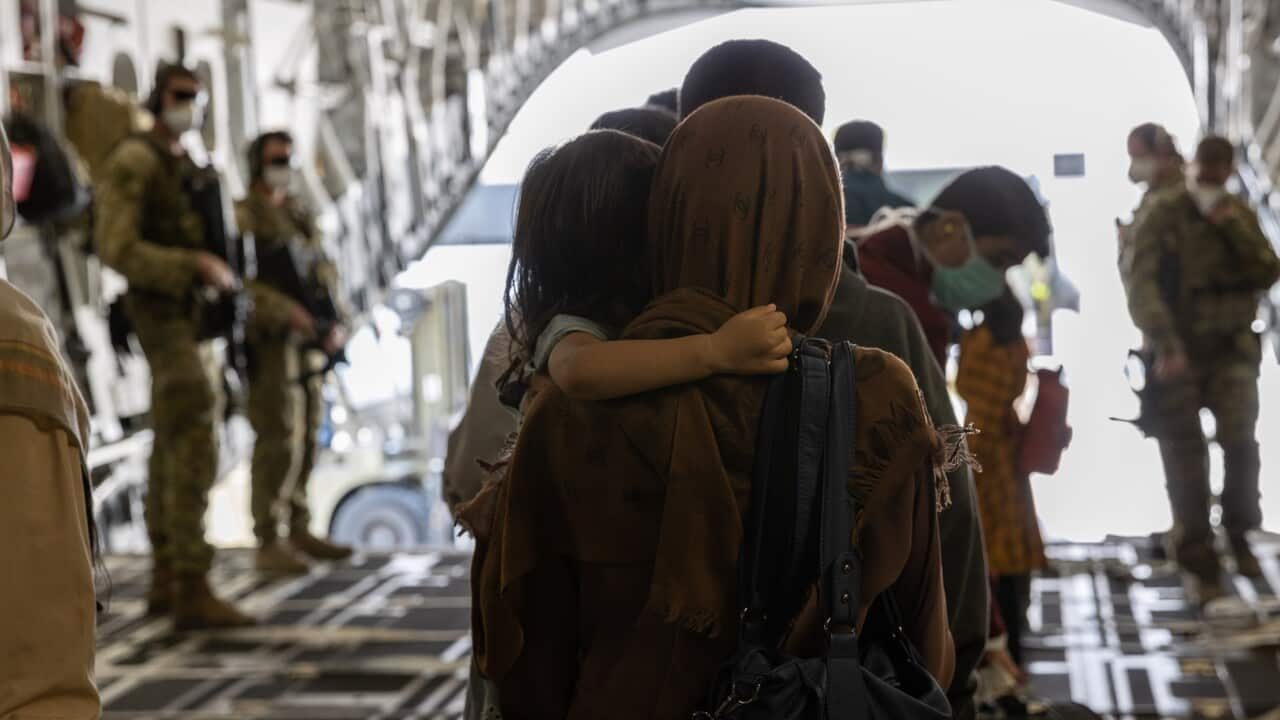Key Points
- Immigration Minister Andrew Giles has described demand for visas from Afghan nationals as "overwhelming".
- Only 6,000 permanent humanitarian visas have been granted to Afghan.
Only 6,000 permanent humanitarian visas have been granted to Afghan nationals fleeing their homeland out of more than 211,100 people seeking Australia’s protection.
Almost half of applicants are still waiting for their applications to be considered.
The new figures show that demand for visas from people in Afghanistan has continued to soar coming up to a year since the fall of the capital Kabul to the Taliban last August.
In an exclusive interview with SBS News, Immigration Minister Andrew Giles described the pleas for visas as “absolutely unprecedented”, with his government now responsible for dealing with the requests from Afghan nationals seeking refuge.
"The demand for protection is overwhelming," he told SBS News.
"My focus is on doing everything we can to assist people fleeing persecution and seeking help."
New figures have now revealed 5,929 permanent humanitarian visas have been granted to Afghan nationals, between 15 August 2021 and 31 July 2022.
As at 5 August, 47,912 applications (comprising an estimated 211,122 applicants) had been lodged since the Taliban's ascension to power.
The former Morrison government promised to provide 31,500 humanitarian and family visa places to Afghan nationals over four years, with the response backed by the new government.
Mr Giles says enormous resources are being diverted to the task but new government data reveals the reality of prolonged waiting times being faced by applicants.
It shows more than 40 per cent applications from Afghan nationals have not yet been registered in the computer systems of the Department of Home Affairs.
The figures show 57.4 per cent, or 108,351 applicants, have been registered through this process.
The department is currently registering applications which were received on 21 September 2021.

A graphic shows the proportion of applications from Afghan nationals registered in the systems of the Department of Home Affairs. Source: SBS News / Karin Zhou-Zheng.
She recently learned a family member - whose identity has been protected for security reasons - was abducted and killed by the Taliban.
"To be honest, there are no words that I could describe [this]," she told SBS News.
"For all this time we are trying to find out where here is and what happened and sadly we found the dead body of this family member."

Nashid Ali speaks to SBS News. Source: SBS News
On one application, Ms Ali said the family had not even received a confirmation of the department receiving the request.
"They are at high risk because of their work with the previous government," she said.
"It's sad, it's frustrating and it is scary as well because we don't know what's going to happen.
"Even though we are living in peace it does affect you when you are witnessing what's happening with a family member."
'Enormous number of resources' diverted to processing delays
The government says it’s taking longer than normal to respond to the applications because of the weight of demand for the humanitarian visas.
Mr Giles said a taskforce had also been established focused on the resettlement of Afghan nationals into Australia to assist in the processing effort.
"We are applying an enormous number of resources to this problem because it is an enormous priority for the government," Mr Giles said.
Australia conducted an emergency evacuation mission to Kabul in the days following the Taliban's ousting of the former government of Afghanistan.
More than 4,100 people were evacuated on 32 rescue flights conducted by Australian military personnel and the Department of Foreign Affairs.
The response included issuing emergency 449 temporary humanitarian visas to Afghans who had served with Australian troops.
Since August 2021, more than 7,000 subclass 449 visas have been issued to Afghan nationals.
Of this category, almost 4,000 Afghans who arrived in Australia with 449 visas have been granted a permanent visa to live in Australia.
In November last year, a ministerial decision was also made to deliver a 12 month extension to the temporary 449 visa, which normally lasts only three months.
But a Senate inquiry conducted in Australia response in Afghanistan last April called on the Department of Home Affairs to.
The Albanese government has maintained that former locally engaged employees (LEE) and their immediate family will be prioritised for visas.
"We are prioritising those locally engaged employees," Mr Giles said.
"Those people who helped Australians through the 20 years we were involved in there are the highest priority."
The government says the visa response will also prioritise women and girls, ethnic minorities and other identified minority groups considered at risk of persecution.
The United Nations has warned the people of Afghanistan, in particular, women and girls have been deprived of their rights since the Taliban's takeover.
The Taliban had promised a general amnesty for those linked to the former government and international forces, and tolerance and inclusiveness towards women and ethnic minorities.
But the group has renewed restrictions on women and appointed an all-male government with these actions met with dismay by the international community.
The United Nations has also documented reports of extrajudicial killings and said human rights advocates and media workers have faced intimidation and harassment.











